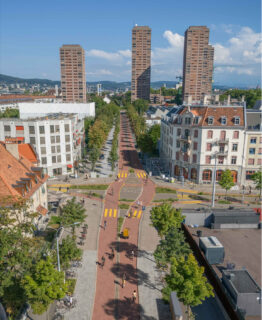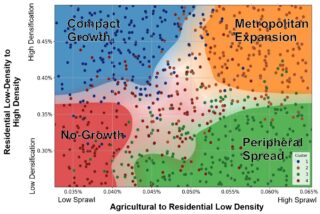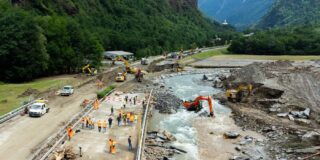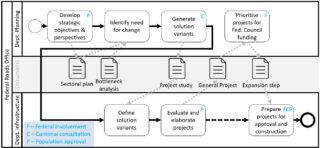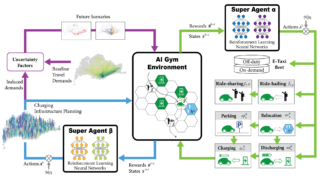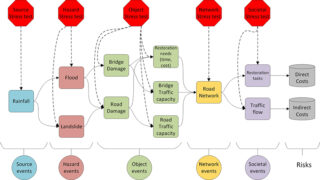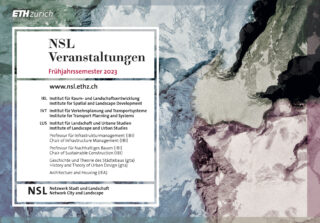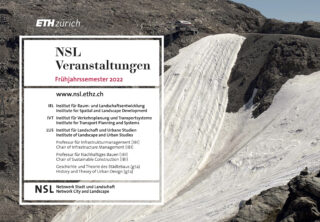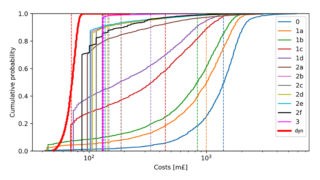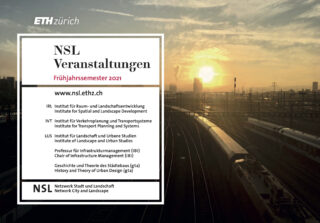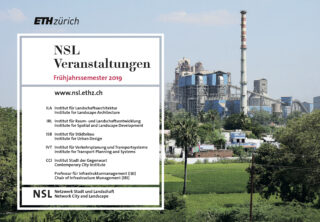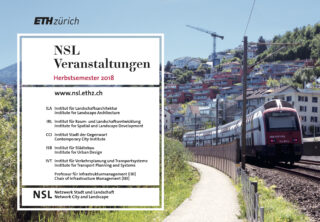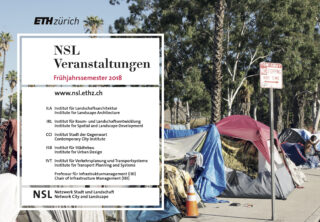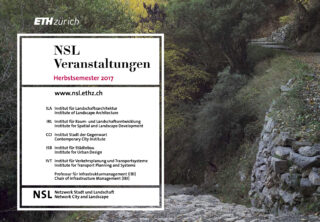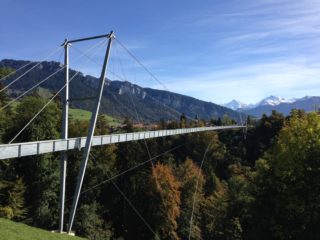E-Bike City: Results
If you missed the event «E-Bike City: Results & Future», have a look at the downloads and recordings section on this website. It offers a brochure, presentations, posters, video recordings, and street visualisations. May they positively impact our traffic situation and quality of life!
Mapping Future Development Scenarios Through Spatial Clustering with Land Use Models
Scenario planning is increasingly used in urban planning in recognition of the uncertain and complex interactions between the built and the natural environment. Scenario planning develops alternative stories about the future, as combinations of important drivers of change, qualitatively. The use of computational models can inform the development More
Reasons to feel confident
From bridges and tunnels to railways, Switzerland has always invested heavily in the upkeep of its infrastructure. But how does it keep everything operating safely and smoothly while also instilling confidence that nothing will go wrong? Read the full article at ETH News
Den Lebensraum der Zukunft gestalten
Der ETH Master-Studiengang Raumentwicklung und Infrastruktursysteme bietet eine fundierte, interdisziplinäre Ausbildung in Stadtplanung, Mobilität und Infrastrukturmanagement. Durch die Verbindung von Theorie und Praxis entwickeln Studierende nachhaltige Lösungen für aktuelle Herausforderungen. In Kooperation mit Professorinnen, Professoren und Studierenden ist ein kurzes Video entstanden, um Studieninteressierte für diesen Fachbereich und More
Why the Rejection of the 2023 Expansion Step for the National Roads? Idea for a National Overall Mobility Concept
On November 24, the Federal Expansion Step 2023 for Road was put up for a public vote. The Expansion Step 2023 is a project programme for national roads consisting of six major projects, including the widening of the A1 highway between Bern and Nyon, as well as three More
Responsiveness of Transport Infrastructure Planning Processes
Responsiveness of planning processes is the ability to meet changing societal transport needs quickly in ways that are acceptable to all stakeholders. In Switzerland, considerable traffic jams and overfilled trains indicate that planning processes could be made more responsive. As delays for travelers persist, their needs are not More
Cost Benefit Analysis of Cycling Infrastructure
Cost-benefit analysis is a tool frequently used in project appraisal to justify the implementation of infrastructures. Due to insufficient recorded data, the construction costs and safety benefits of urban bicycling infrastructure are difficult to estimate, weakening the appraisal and implementation of such projects. In this research, we conducted More
Adaptive Planning for Electric Vehicle Charging Infrastructure
Although a transition to electric vehicles (EVs) has potential to greatly reduce transportation-related greenhouse gas emissions, it faces significant challenges, including range anxiety and limitations in battery capacity. Effective long-term planning for EV charging infrastructure can overcome these barriers and increase the chances of widespread adoption.
Stress Testing Transport Systems
Transportation systems are vital for economic and social development, yet are susceptible to disruptions caused by natural hazards, especially considering the adverse impacts of climate change on increasing the intensity of frequency of climatic hazards. To manage these risks effectively, stress testing, as a diagnostic tool, has shown More
Adaptive Urban Planning for an Uncertain Future: Infrastructure Interventions for the Technological Shift in Transportation
Planning cities to adapt to the future is challenging due to complex interactions between mobility, infrastructure, and land use. This challenge is exacerbated by the need to study future uncertainties such as ever-shifting demographics and industrial landscape, increased environmental and climatic changes, disruptive and unpredictable technological development, and More
E-Bike City: Nur noch die Hälfte der Strassen für die Autos
30. August, 2023, 18:30 – 19:45 | Podiumsdiskussion | Karl der Grosse, Saal, Kirchgasse 14, 8001 Zürich.
NSL Veranstaltungsplakat Frühjahrssemester 2023
Das neue NSL Veranstaltungsplakat Frühjahrssemester 2023 ist da!
E-Bike City Kolloquium
8. Juni 2023, 9:00 – 18:30 | ETH Zürich, Zentrum, Audimax. An diesem Kolloquium werden die sieben Forschungsgruppen des D-BAUG Leuchtturmprojekts «E-Bike City» nicht nur ihre vorläufigen Ergebnisse präsentieren, sondern auch die Teilnehmenden aktiv in die Gestaltung der Forschungsfragen einbeziehen.
NSL Veranstaltungsplakat Herbstsemester 2022
Das neue NSL Veranstaltungsplakat Herbstsemester 2022 ist da!
Will E-Bikes Bring Amsterdam and Copenhagen to Switzerland?
Kick-off event | 23 November 2022, 13:30, aperitif around 18:00 | HG F 30 (Audi Max), ETH Zürich, Zentrum. Registration deadline 9 November.
NSL Veranstaltungsplakat Frühjahrssemester 2022
Das neue NSL Veranstaltungsplakat Frühjahrssemester 2022 ist da!
Investing in Water Supply Resilience Considering Future Uncertainty and Management Flexibility
The infrastructure required to provide sufficient high quality drinking water to urban areas over long time horizons is highly uncertain. The use of the real options method, which accounts for future uncertainty and considers management flexibility over time, can significantly improve the evaluation of water supply resilience enhancing More
NSL Veranstaltungsplakat Herbstsemester 2021
Das neue NSL Veranstaltungsplakat Herbstsemester 2021 ist da!
NSL Veranstaltungsplakat Frühjahrssemester 2021
Das neue NSL Veranstaltungsplakat Frühjahrssemester 2021 ist da!
Quantitative Evaluation of Highway Designs Considering Uncertainties in Future Mobility Patterns and Flexibility Using Real Options
Road owners are increasingly being confronted with the need to optimize highway design for an uncertain future. A recent research project at the Infrastructure Management Chair investigated the use of a real options-based method to evaluate alternative highway designs for a fictive case study based on the A15 More
Flexible Office Space for the Age of Distributed Work
The potential large-scale transition from working in the office to working at home, is a massive uncertainty related to the future needs of office space in our cities. It is in the face of this uncertainty, that real estate developers must manage their portfolios. The use of the More
Are Integrated Infrastructure Networks Governable in Contemporary City Regions?
Guest: Prof. Dr. Michael Neuman, Professor of Sustainable Urbanism, Faculty of Architecture and the Built Environment, University of Westminster. The very possibility of governance that is critical — in terms of providing robust human rights, meaningful participative democracy, equitable distribution of wealth, goods and services, and strong environmental More
Future-proofed Urban Areas: Real Options in Urban Planning
The societal needs for infrastructure change drastically over time depending on a large variety of factors, which are very difficult to predict. It is in the face of this massive uncertainty, that urban planners are expected to make infrastructure decisions. To minimize the service risks over time, the More
NSL Veranstaltungsplakat Herbstsemester 2019
Das neue NSL Veranstaltungsplakat Herbstsemester 2019 ist da!
NSL Veranstaltungsplakat Frühjahrssemester 2019
Das neue NSL Veranstaltungsplakat Frühjahrssemester 2019 ist da!
Bryan Adey appointed as Full Professor of Infrastructure Management
On the recommendation of ETH President Lino Guzzella, the ETH Board has appointed Professor Bryan Adey (*1972), currently Associate Professor at ETH Zurich, as Full Professor of Infrastructure Management.
NSL Veranstaltungsplakat Herbstsemester 2018
Das neue NSL Veranstaltungsplakat Herbstsemester 2018 ist da!
To Exploit Big Data for the Management of Infrastructure
The management of infrastructure involves estimating how infrastructure is likely to deteriorate and how demands infrastructure change over time. Increasing amounts of data and increasing modelling capabilities are providing infrastructure managers with improved abilities with which to determine the optimal maintenance and development interventions on infrastructure. Their exploitation More
NSL Veranstaltungsplakat Frühjahrssemester 2018
Das neue NSL Veranstaltungsplakat Frühjahrssemester 2018 ist da!
NSL Veranstaltungsplakat Herbstsemester 2017
Das neue NSL Veranstaltungsplakat Herbstsemester 2017 ist da!
The Interdisciplinary Nature of Planning Interventions on Network Infrastructure in Urban Areas
Interventions must be executed on infrastructure networks in urban areas to ensure that they provide adequate levels of services. The optimal planning of these interventions requires consideration of the work of many experts to appropriately consider the spatial and temporal aspects of the networks, how the networks might More
Bryan T. Adey, the Professor for Infrastructure Management at the ETH Zürich, Joins the NSL
His research mission is to improve the construction and management of infrastructure with special attention focused on the improvement of decision making from general planning for entire networks to detailed planning for specific projects. This mission is being achieved through teaching the fundamentals of infrastructure management, and pushing More
